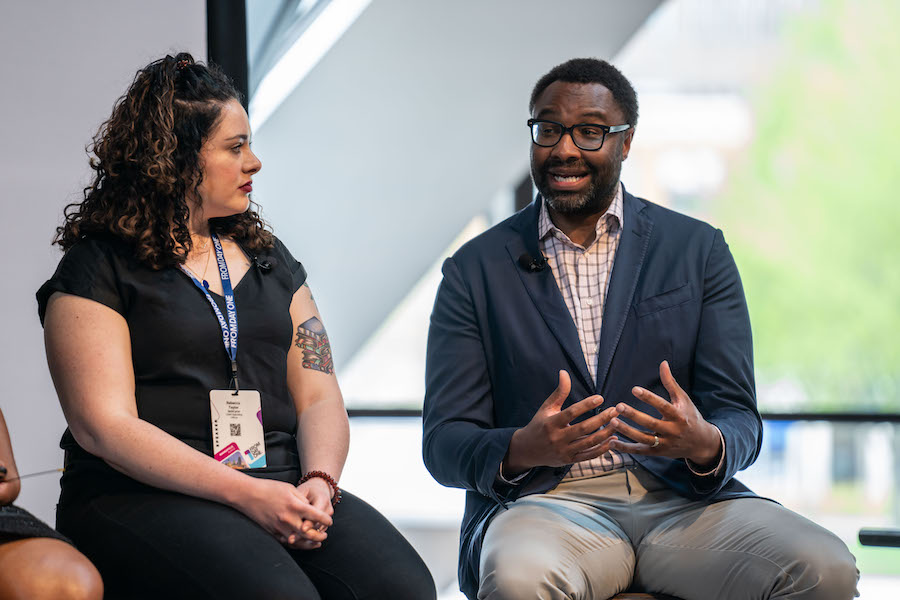Empowering Inclusive Career Growth and Leadership Advancement in Your Company


The art of building an equitable workforce starts with the complicated and expensive process of recruiting, hiring and onboarding diverse candidates.
The next step is implementing DEI (diversity, equity and inclusion) processes, policies, programs and procedures that build internal pathways for promotions and empower diverse workers to ascend to satisfying careers. That deft execution is key to retaining talent and reaping the benefits that accompany a truly diverse workforce; multiple studies find diverse workplaces are both more profitable and more productive.
But too often, businesses are not transparent about how they measure behaviors that determine whose career gets elevated. When the process is mysterious to employees, it can thwart their ability to advance, according to Rebecca Taylor, chief customer officer and co-founder of HR platform SkillCycle.
“It's being very clear about, these are the behaviors that we expect, these are the competencies for these roles, and really making it clear so that someone could always see themselves in that role,” Taylor said. “They can live those behaviors or find a way to embrace them if it's a skill that they have to learn.”

At a From Day One conference in Minneapolis in May, Taylor was part of a panel of top HR and DEI leaders who spoke to an audience of HR professionals. They shared their strategies for building a pipeline to elevate the careers of diverse employees.
“The intentional DEI mindset makes sure we are removing barriers for talented individuals. We never want to leave talent on the table,” said Mahogany Ellis-Crutchfield, strategic diversity, equity & inclusion projects lead at Cargill.
Ellis-Crutchfield explained how Cargill, the nation’s largest private business, has adopted a range of steps to broaden inclusivity. It has expanded career prospects for its diverse workforce by giving employees a work equivalency option for a college degrees, adding apprenticeships and launching more opportunities for job shadowing.
“We revamped our HR system to allow employees to create a kind of internal LinkedIn profile [that's] browsable by certain leaders. It has your work experience, you also put in things like where you'd like to go,” she said. “There's a lot of mystery and kind of this black box around who gets chosen to move up. We want to empower our employees and say, you can take part in that. We've created opportunities for people to participate in their own career growth.”
.jpg)
One way Land O’Lakes has changed to achieve its DEI goals is to expand the colleges and universities it has traditionally recruited from, adding HBCUs. The agribusiness and food company has also helped employees burnish their resumes through a mentorship program that pairs talented diverse individuals in the early stages of their careers with top seasoned managers.
It’s a strategy that has created growth and empathy in both sides of the mentoring relationship.
“Employees are getting higher level access to leadership and leadership has a better understanding, what are some of those barriers (in the workplace)? What are some things that get in the way?” said Philomena Satre, director of diversity and inclusion and strategic partnerships at Land O’Lakes. “When leaders hear the voice of employees and some of the challenges that they face, that really makes the difference.”
New employees coming into an organization and existing employees who are leaving can each provide an internal window into where a company may be falling short in achieving success in diversifying its workforce.
“Think a lot about how candidates are going to perceive you through that interview experience,” suggested Dannette Hanson, head of talent acquisition for Nielsen.
Noting that diversity efforts include bringing women into nontraditional fields, Hanson went on to explain a problematic pattern identified by her previous employer.
“Time and time again, our recruiters would do the great work of going after female engineers, getting them excited to come and interview,” she said. “But we discovered through feedback that they offered was, ‘every person that I met was a white male in their 50s, and that's not really a team that I want to be part of.’”
Joffrey Wilson, vice president of diversity, equity & inclusion at Mortenson, said his team learned surprising lessons through exit interviews. Wilson said that Mortenson, a construction and real estate development company based in Minneapolis, created problems for itself by not clearly communicating career plans for top talent who had been internally identified as high potential.
“Team members that we wanted to retain that we lost, we'd have conversations with folks, there'd be a consistent theme that the organization saw that person in a certain light and that person didn't know it,” he said.
Wilson said Mortenson has taken steps to become “very intentional” with high-performing, diverse employees. Leaders have taken steps to routinely intersect with them, customize their career planning and ready them for moving up.
“We can communicate to them, no promises, but communicate where we see them going and how we potentially can get them there,” he said. “This may include Mortensen leadership development opportunities, it may be external opportunities. It could be a coach, it could be a sponsor.”
But initiatives to open doors for career growth and leadership advancement have been made more difficult coming out of the pandemic in a changed work place, warned Rebecca Taylor of SkillCycle.
“It's been a lot harder for companies who've been adjusting to a hybrid work model or remote work model because all the norms that we knew before have changed,” she said.
“It's about always being open to revisiting and revising how you identify high potential in your organization to make sure that you are being inclusive across the gamut with every single role.”
Kevyn Burger is an award winning broadcaster and freelance writer based in Minneapolis.
The From Day One Newsletter is a monthly roundup of articles, features, and editorials on innovative ways for companies to forge stronger relationships with their employees, customers, and communities.